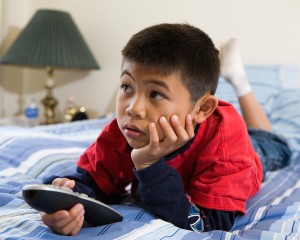 So plopping your preschooler in front of the television to gawk at “SpongeBob SquarePants” — a frenetic cartoon featuring scene changes every 11 seconds — impairs his attention span. Who could have guessed?
So plopping your preschooler in front of the television to gawk at “SpongeBob SquarePants” — a frenetic cartoon featuring scene changes every 11 seconds — impairs his attention span. Who could have guessed?
This astonishing revelation comes courtesy of the Pediatrics journal of the American Academy of Pediatrics. The journal recently published a study showing that 4-year-olds exposed to just nine minutes of the cartoon fared far worse than their non-“SpongeBob”-watching counterparts on tests measuring focus and self-control. Authored by University of Virginia professors Angeline Lillard and Jennifer Peterson, the study has spawned yet another media-consumption warning for parents: When it comes to today’s frenzied, fast-paced children’s shows, even brief bursts of the boob tube can hurt kids.
Predictably, the warning has sparked controversy. Nickelodeon dismissed it by explaining that its highest-rated cartoon show is intended for 6- to 11-year-olds, not preschoolers — a comforting fact, since we know how uncommon it is for children to eavesdrop on cartoons intended for their older siblings.
Other critics noted that the study examined only the immediate aftermath of nine minutes of “SpongeBob” viewing. Maybe those preschooler attention spans bounced back an hour after the study concluded? It’s possible, but as the researchers noted, the link between early television viewing and long-term struggles with attention, memory, self-control and delayed gratification is well-documented. And the average preschooler watches not nine minutes of television a day but 90.
That’s true despite the fact that groups like the American Academy of Pediatrics have been warning for years about the detrimental effects of too much media consumption among children. The academy recommends no television at all for children under age 2 and only one to two hours of total screen exposure to entertainment media — including television, DVDs, computers and video games — for children older than 2.
Yet the Kaiser Family Foundation reported in 2003 that children 6 and under were spending as much time staring at screens as playing outside — and far more time with the boob tube than with books. Nearly a third of children 3 and under, and nearly half of children ages 4 to 6, had a television in their bedrooms. And despite reams of studies telling them otherwise, parents of young children were far more likely to describe television as something that “mostly helps” their children’s learning than something that “mostly hurts” it.
America’s addiction to television, video games and the Internet only has intensified since that study debuted. Kaiser released another report last year that found the average 8- to 18-year-old now spends nearly eight hours a day using entertainment media — the equivalent, in a year’s time, of staring at a screen 24 hours a day for 115 days straight. The Kaiser study noted that heavy media users get lower grades, perhaps because half of children today use such media while doing their homework.
Although such statistics often prompt rounds of hand wringing and head shaking when they debut, they rarely change parental choices. The reason is simple.
It may seem obvious that preschoolers who spend hours staring slack-jawed at cartoons and schoolchildren who do homework while simultaneously texting, Web-surfing and video-gaming will not fare as well as those who focus on one task at a time and engage more with live human beings than virtual ones. But acknowledging such realities requires parents to make uncomfortable changes: to rely less on electronic babysitters, to engage their children in more time- and energy-consuming active play and to limit their own screen time as well as their children’s. To face such facts is to take the first step out of the media-saturated mainstream onto a lonely road — the path toward becoming one of “those” parents, the kind branded as oddballs for restricting what others allow and refusing to follow today’s herd mentality of child-rearing.
It’s easier to ignore the studies and believe that all this media consumption is good for kids — that somehow, a childhood spent staring at screens is just as enriching as one spent exploring the great outdoors, getting lost in good books and learning to depend on one’s imagination and playmates, not gadgets, for entertainment.
It’s easier. If only it were true.



